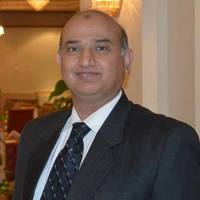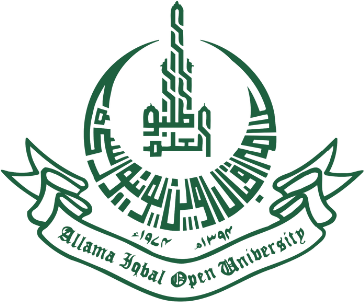
Education
Dr. Gulzar holds a Ph.D. in Applied Linguistics, an MA TEFL and an MA English literature and certificates in Teaching EFL Using the New Technologies from the Brighton University, UK. H is author of three books and a large number (48 research articles published in national and international journals) of research articles, besides being the author and/or editor of the books developed in AIOU and Taif University. He has 26 years experience of teaching English as a Foreign/Second Language at the college and university levels at national and international level. He designed curriculum, syllabus, and teacher development courses for different levels at AIOU, Pakistan & Taif University, KSA. His major interests fall in areas such as ELT in bilingualism/multilingualism, issues and concerns of language policies, error analysis, language change and shift, teacher development, and in the philosophy of language acquisition and learning, discourse studies, curriculum development and syllabus design. He has research experience of working on projects concerning the different aspects of the English language teaching. Besides, He is member of SPELT, PAK ELT Forum and a couple of other professional societies.
Experience
Approximately 30 years of experience with the most recent as:
|
No |
University |
Designation |
Duration |
|
1 |
Allama Iqbal Open University, Islamabad,Pakistan.
|
Chairman |
2017-To-date |
|
2 |
Allama Iqbal Open University, Islamabad,Pakistan
|
AssociateProfessor |
2015-To-date |
Publications
RESEARCH PUBLICATIONS
-
- Kanwal. N.,Shahnaz. A., Gulzar, A. M., Shah. S.,(2021) Cross-Cultural Study of Speech Acts and Politeness in Urdu and English Short Stories, ELF Annual Research Journal Vol. 23, pp. 93-122, Shah Abdul Latif University, Khairpur, Pakistan.
- Kanwal. N.,Shahnaz. A., Gulzar, A. M.,(2021) Academic Writing and Issues of Identity: A Focus on Texts and Practices of a Postgraduate Student, Erevna: Journal of Linguistics & Literature, Vol. 5 No. 2, pp. 35-50, Air University, Islamabad, Pakistan.
- Iqbal. Z., Gulzar, A. M., Umar.L., Khan.,U.,(2021) Interstitial liminality, Assimilation and Alterity in H. M. Naqvi’s Home Boy, Kashmir Journal of Language Research, Vol. 24 No. 2, pp. 55-74, University of Azad Jammu and Kashmir, Muzaffarabad, Pakistan.
- (2021). Exploring the efficacy of Zoom as MALL tool in Pakistan, Elementary Education Online journal, Vol 20 No. 5, pp. 6058-6071Ilkogretim Online - http://ilkogretim-online.orgdoi:10.17051/ilkonline.2021.05.680
-
- Iftikhar, S., Zahra, T.,& Gulzar, A.,(2021).A Corpus-Based Study of the Metaphor Silence in Lahore, I Am Coming. NUST Journal of Social Sciences & Humanities, Vol. 7 No. 2, pp. 260-274. NUST Journal of Social Sciences & Humanities, Pakistan.
- Uzair, M., Khan,U.,Zaigham, S.M.,& Gulzar, A.M.,(2020).Parametric Difference Between English and Urdu In Terms Of Null Subject Parameters, Elementary Education Online journal, Vol 19, No. 04, pp. 6161-6171 Ilkogretim Online-http://ilkogretim-online.org doi:10.17051/ilkonline.2020.04.765024
- Iqbal, Z., Gulzar, A. M., Imran. R., & Ali, M.M., (2020). Navigating Diasporic Mediations: Between Home and Host Location[S]inPost9/11ContextinMohsin Hamid’s The Reluctant Fundamentalist, Vol. 04, No.1, pp.15-30. ErevnaJournalofLinguisticsandLiterature,AirUniversity,Islamabad.
- Gulzar, A.M., Ali, M.M.,Malik. A.N., Imran, R., & Zaman, S., (2019). A Critical Discourse Analysis of Zulfiqar Ali Bhutto’s Speech in the General Assembly of the United State. Kashmir Journal of Language Research, Vol. 22,No.2,pp.53-66.University of Azad Jammu and Kashmir, Muzaffarabad, Pakistan.
- Malik.A.N.,Ali,M.M.,& Gulzar,A.M.,(2019).On Formal Distinction Between Intra-sentential Code switiching and Borrowing. Pakistan Journal of Languages and Translaltion Studies, Issue 07, No.2, pp.94-109. University of Gujrat, Pakistan.
- Zaman, S., Akhtar, N. R., Ali, S., & Gulzar, A. M., (2019). Experimenting Peer Mentoring in Pakistani ESL Context. Kashmir Journal of Language Research, Vol. 22, No.1, pp.51-72. University of Azad Jammu and Kashmir, Muzaffarabad, Pakistan.
- Gulzar, A.M.,Ali, M.M., Jived, Z.J.,& Farooq, U.M.,(2018).The Implications of Trends in Punjabi: As a Covert and/or an Overt Prestige in Pakistan. Kashmir Journal of Language Research, Vol.21,No.2,pp.59-75.University of Azad Jammu and Kashmir, Muzaffarabad, Pakistan.
- Ali, M.M., Gulzar, A.M.,& Anwar, N.M., (2018). Impact of MALL on Grammar of EFL Learners in Pakistan. ELF Annual Research Journal Vol. 20 pp.39-56,ShahAbdulLatifUniversity,Khairpur,Pakistan.
- Ali, M. M., Gulzar, A.M.,& Yasmeen, T.,(2018).Teachers’ Perspective towards Mobile Assisted Language Learning in Pakistani ELT classrooms. New Horizons, Research Journal Faculty of Social Sciences, Vol.12, No.2, pp. 77-92,GreenwichUniversity,Karachi,PakistanMauritius.
- Shah, S., David, K.M.,& Gulzar, A.M.,(2017).A Role of Hindko in Multi lingual Community: Issues of Language(s) Choice and Use. Kashmir Journal of Language Research, Vol. 20, No.1, pp.95-108, University of Azad Jammu and Kashmir, Muzaffarabad, Pakistan.
-
- Javed, Z. C., Farooq, U. M., Umar, M., & Gulzar, A. M., (2017). A Gender-based Investigation of Attitudes of Saudi EFL Learners towards English Language Teaching. NUML Journal of Critical Inquiry, Vol. 15, No.1, pp 44-66, National University of Modern Languages, Islamabad, Pakistan.
- Ali, M.M., Gulzar, A. M., & Malik, N. A. (2017). A Corpus Based Study of Topicalization in Academic Spoken Discourse of Pakistani Theses Defence. PUTAJ – Journal of Humanities and Social Sciences Vol. 24, No. 1, pp 57-74,UniversityofPehawar,KhyberPakhtunkhwa,Pakistan.
- Gulzar,M.A.,Buriro,A.G.,& Charan, A.A.,(2017).Investigating the Effects of Rubrics on Assessment of Writing Tasks, International Research Journal of Arts & Humanities (IRJAH)Vol 45, No 45, pp. 191-206, Faculty of Arts, University of Sindh, Jamshoro, Pakistan.
- Ali,M.M.,Gulzar,M.A.,Mahmood, A.M,(2017).A Pakistani Perspective About the Influence of Mobile Assisted Language Learning on Madrassa Students. Journal of Language, Linguistics and Literature, Vol. 05, pp. 01-21.FatimaJinnahWomenUniversity,Rawalpindi.
- Anjum, U.,Khan, Q., &Gulzar, A. M. (2016). Translation, Cultural Adaptation and Cross Language Validation of Domains of Language Use Patterns. Journal ofAsianCivilization,Vol.39.No.2,pp.1-24,Quaid-e-AzamUniversity,Islamabad, Pakistan
- Ali, M.M., Gulzar, M.A., Malik, N., & Zaheer, S. (2016). Gullu and Gulluism: AnewSocio-Political Phenomena in Pakistan. Kashmir Journal of Language Research, Vol. 19, No.2, pp.213-228. University of Azad Jammu and Kashmir, Muzaffarabad, Pakistan.
- Noor, A.,Gulzar, M.A., Javid, C. Z.(2016). Pronunciation of Monophthongs and Diphthongs among Punjabi Speaking EFL Learners, ELF Annual Research Journal Vol. 18pp.153-168, Shah Abdul Latif University, Khairpur, Pakistan.
- Ali.M.M.,Gulzar. A. M.,(2016).Call Integration: Difficulties and Barriers Faced by ELT Teachers, Vol. 28 (5), pp. 483-490, Journal Science international. Lahore, Pakistan. http://www.sci-int.com/pdf/12435904131%20a%20483-491%20Muneeb%20CALL%20Integration%20(muneeeb%20ali).pdf
- Abdul rahman A.A. & Gulzar, M.A. (2016). The Use of EFL Authentic Materials: A Gender-Line University Teachers' Perspective. International Journal of Applied Linguistics & English Literature Vol. 5 No. 2; pp 128-136, Australian International Academic Centre. Australia. URL:http://dx.doi.org/10.7575/aiac.ijalel.v.5n.2p.128
-
- Gulzar, M.A. (2015). A Role of Krashen’s Five Hypotheses in the Context of Teaching English in Pakistani Classrooms. Journal of Language, Linguistics and Literature, Vol.3,pp.71-80, Fatima Jinnah University, Rawalpindi, Pakistan.
- Farooq, U., Javid, C. Z., Umar, M., & Gulzar, M.A. (2014). Technology and English Language Teacher Education Progammes in Pakistan: Emerging Trends. Journal of Language, Linguistics and Literature, Vol. 2, pp. 55-76, Fatima Jinnah University, Rawalpindi, Pakistan.
- Gulzar, M.A. & Abdulrahman A.A. (2014). Effects of Print Media: A Study of Reading Skills among University EFL Students. Research on Humanities and Social Sciences, Vol.4, No.28; pp 68-79, ISSN (Paper) 2224-5766 ISSN (Online)2225-0484(Online)www.iiste.org
- Gulzar, M.A. & Abdul rahman A.A.(2014). Code Switching: Awareness Amongst Teachers and Students in Saudi Universities EFL Class rooms. English Language teaching, Vol. 6, No. 2, pp. 1-13; published by the Higher Education of Social Science. URL: http://www.cscanada.net/index.php/hess/article/view/j.hess.1927024020140602.4437
-
- Gulzar, M.A.(2013).Trends of Inter-Sentential Switches: Are They Same between Male and Female Teachers? Kashmir Journal of Language Research,Vol.16,No.2,pp.175-206.University of Azad Jammu and Kashmir, Muzaffarabad, Pakistan.
- Gulzar, M.A., Fakhar, S., & Javid, C. Z.(2013). Constructive Feedback: An Effective Constituent for Eradicating Impediments in Writing Skills, English Language Teaching, Vol. 6, No. 8; pp 21-32, Published by Canadian Center of Science and Education Online Published: July 4, 2013, doi: 10.5539/elt. v6n8p21 URL:http://dx.doi.org/10.5539/elt.v6n8p21
- Gulzar, M.A.& Abdul rahman A.A.(2013).Intra-sentential Patterns of Code-mixing between Bilingual Male and Female Teachers: A Comparative Study. European Journal of Scientific Research, Vol.97, No3, pp. 411-429. http://www.europeanjournalofscientificresearch.com/ISSUES/EJSR_97_3.htm
- Gulzar, M.A. & Abdul rahman A.A.(2013).EffectsofTeachers’NonverbalCommunicationontheLearnabilityoftheAdultSaudiEFLLearners:ACaseStudy.European Journal of Scientific Research. Vol. 96, No 4 pp. 553-571,http://www.europeanjournalofscientificresearch.com/ISSUES/EJSR_96_4.htm
- Sultana, N., Gulzar, M. A. & Ijaz, A. (2012). Towards The Typology Of Code-Switching in Pakistani English Novels .KJLR Vol. 15,No.2,pp.77-102,University of Azad Jammu and Kashmir ,Muzaffarabad, Pakistan.
- Javid,C.Z.,Farooq,U.,& Gulzar, M.A.(2012).Saudi English-major Under graduates and English Teachers' Perceptions Regarding Effective ELT intheKSA:AComparativeStudy.EuropeanJournalofScientificResearch,VOL.85(1),pp.55-70.ISBN:1450-216X /1450-202XAvailable online athttp://www.europeanjournalofscientificresearch.com/ISSUES/EJSR_85_1.htm
- Gulzar, M.A., Abdul rahman A.A.,Saeed, F.(2011).Developing a Module for Rectification Taxonomy pro ELT Teachers. Kashmir Journal of Language Research, Vol. 14, No.1, pp.63-87. University of Azad Jammu and Kashmir ,Muzaffarabad, Pakistan.
-
- Farooq, U., Gulzar, M.A. (2011). Interaction with Tutors, and Peers in Virtual Class room: A Case Study of Online English Language Teaching Programme in Pakistan. The Journal of Humanities & Social Sciences, Vol. XIX No.1, pp 21-42,UniversityofPeshawar,Pakistan.
- Gulzar, M.A., & Ali, M. (2010). Significance of Print media: A Study of Reading Skills Among Schools Students. Journal of Gender and Social Issues, Vol. 9,No.1,pp27-42,Fatima Jinnah Women University, Rawalpindi, Pakistan.
- Sultana, N., & Gulzar, M.A. (2010). Code Switching as a Teaching Strategy. NUML Research Magazine, Vol 8, (1), pp 24-44, National University of Modern Languages, Islamabad, Pakistan.
- Gulzar, M.A., & Qadir, S. A. (2010). Socialized Patterns of Discourse: Language Choice in Teachers’ Talk. Kashmir Journal of Language Research, Vol. 13 No.2,pp29-58,UniversityofAzadJammuand Kashmir, Muzaffarabad, Pakistan.
- Gulzar,M.A.,& Sultana.,N.(2010).Analysis of Rectification Processing Pakistani Context: A Case Study, Journal of Social Sciences, Vol. 4 No.1, pp101-115, Government College University Faisalabad, Faisalabad, Pakistan.
- Gulzar, M.A. (2010). Code-Switching: Awareness about its Utility in Bilingual Class rooms. Bulletin of Education and Research, Vol.32,No.2,pp23-44, Institute of Education and Research, University of the Punjab, Lahore, Pakistan.
- Gulzar, M.A., & Qadir, S.A. (2010). Issues of Language(s) Choice and Use: A Pakistani Perspective. Pakistan Journal of Social Sciences, Vol. XXX No.1, pp45-67,BahauddinZakariyaUniversity,Multan,Pakistan.
- Gulzar, M.A., & Hafeez, A. (2009). Code-switching between English and Urdu Languages. Journal of Social Sciences & Humanities, Vol. XVII No.2, pp 43-76,Allama Iqbal Open University, Islamabad, Pakistan.
- Farooq,U.,& Gulzar, M.A. (2010). Cost-effectiveness of Computer-mediated Communication in Distance Education, Journal of Social Sciences & Humanities, Vol. XVIIINo.1, pp 147-170, Allama Iqbal Open University, Islamabad, Pakistan.
- Gulzar, M.A.(2009).Error Analysis System in the Writings of Students at Intermediate Level: A Pakistani Context. Pakistan Journal of Education, Vol. 26,IssueII,pp53-74,Islamabad:Allama Iqbal Open University, Islamabad.
- Gulzar, M.A. (2009). Bilingual Style: A Counter Productive Strategy in Target Language Classrooms. Journal of Gender & Social Issues, Vol. 8, No.1., pp 1-12,Fatima Jinnah Women University, Rawalpindi, Pakistan.
- Gulzar, M.A. (2009). Use of the Learners’ First Language in EFL class room: Justification, Kashmir Journal of Language Research, Vol. 12, No.1, pp 93-125, University of Azad Jammu and Kashmir, Muzaffarabad, Pakistan.
-
- Gulzar, M.A. & Sutana, N. (2008). Shift in the Language Teaching Methods: Implications of the Methodologies in Pakistani EFL Class rooms. Kashmir Journal of Language Research, Vol. 11, No.1, pp 121-130, University of Azad Jammu and Kashmir, Muzaffarabad, Pakistan.
- Gulzar, M. A. Farooq. U. (2009). Linguistic Controversy: Promotion of English as an Elite Language. Journal of Social Sciences & Humanities, Vol. XVII, No.1,pp1-12,Allama Iqbal Open University, Islamabad, Pakistan.
Project, Research Interests
Applied Linguistics
Socilinguistics
